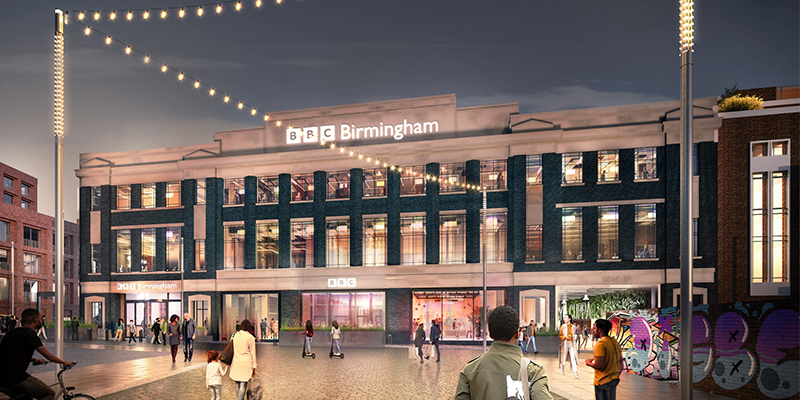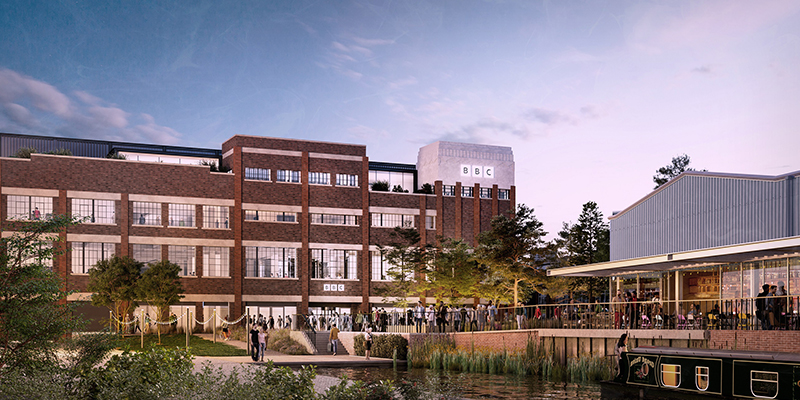News
17 March 2023
Planners approve BBC’s new Digbeth factory home
Acting on behalf of Stoford, Turley has helped secure the go ahead for the BBC’s new home at the former Typhoo ...
What are you looking for?
Earlier this year, we acted on behalf of Stoford and received approval for its refurbishment as the new home of the BBC in Birmingham, and in our second in a series of articles exploring the creative and cultural powerhouse that is Digbeth, we take a closer look at the forthcoming transformation of the former Typhoo Tea Factory and its part in the wider regeneration of the district as it forms the location of a growing cluster of creative media organisations.
Typhoo Tea was founded in 1903 by Sir John Sumner and is instantly recognisable as one of the nation’s favourite tea brands. In 1926, after outgrowing previous premises in the city, the business moved to Bordesley Street in Digbeth, and built the Typhoo Tea packing works, joining a host of industry and production in the district which formed the heart of Birmingham’s industrial revolution. The business continued to expand across the site, until the factory relocated to Merseyside in 1978. Left behind, a somewhat uncharacteristically large building for Digbeth, but an important example of the larger industrial works and art-deco 1930s heritage in the district, and a landmark of the surrounding townscape.
Like much of Digbeth, the former factory and surrounding area fell into decline in the latter part of the 20th Century, due to de-industrialisation, suburbanisation and the cutting off from the city centre by urban highway projects. However, a more recent reversal of that trend has seen the area begin to renew and flourish as a home for creative, cultural and technology enterprises alongside food, beverage and nightlife, akin to the transformations of the Northern Quarter in Manchester or Shoreditch in London.
In Digbeth, this began with the conversion of previous industrial units into makeshift studio space and meanwhile uses, alongside the redevelopment of the Custard Factory, in the late 1990s and early 2000s. This process was aided by the wider ambition by Birmingham City Council and partners since the 1980s to reposition and rebuild the city; including the key intervention to remove the inner ring road and rebuild the Bullring Shopping Centre, which in doing so vastly improved the connectivity of Digbeth to the city core. This flourishing is catalysed by the district’s unique gritty and urban character, which makes it an attractive alternative to the city heart and its proximity to HS2 and the Birmingham Eastside Metro extension. The regeneration of Digbeth correlates with a national and local recognition of culture as central to urban regeneration policies and its potential to deliver significant sustainable revitalisation[1] in this period. This new industrial revolution played host to small and medium sized creative, media and digital businesses, alongside temporary uses of empty space previously home to metalworks and warehouses. With the quarter growing, 2008 saw the opening of Fazeley Studios, delivering additional office and event space. The growth of the creative cluster in the district included a number of studios and television producers, including ‘Maverick TV’ production company. Alongside this, the region’s universities have expanded their offer in media and production related courses; including both creative courses housed in Digbeth by Birmingham City University and BIMM, and in nearby Eastside.
What has until recently been a bubbling story of regeneration is now shifting gears. While its burgeoning neighbours enjoyed a new lease of life, Typhoo had remained empty: until its feature use as a filming location for the Steven Spielberg film ‘Ready Player One’ – an example of its meanwhile use while long-term regeneration plans were prepared.
Now, those plans are being realised. After 50 years of dereliction, the former Typhoo Tea Factory will now become the home of an expanded BBC in Birmingham, now named ‘The Tea Factory’. Acting on behalf of Stoford, we secured full planning permission for the development which includes the partial-demolition, refurbishment and extension of the locally-listed building for the regional headquarters of the corporation, alongside public realm works and new commercial units for retail, food and beverage.

As part of their ‘Across the UK’ programme to transform the world’s oldest broadcaster to better reflect the whole of the UK and be closer to its audiences, the BBC will invest over £700 million in the relocation of operations and job roles outside of London. Expanding upon their existing 700 staff located at The Mailbox, the Tea Factory will play host to teams including BBC Three, The Archers, BBC Asian Network, BBC Newsbeat, BBC Radio WM and Midlands Today across 80,000sq ft of purpose-built studio, production and office space. BBC Studios, the commercial arm of the broadcaster producing content for both BBC Three and outside of the channel, will also be located within the development. The Tea Factory will provide state-of-the-art office and production space for the broadcaster within a flexible and sustainable building. In doing so, the BBC will make a significant ‘return’ to the city following the closure of Pebble Mill in the early 2000s – marking a step-change in the kind of investment Digbeth has experienced so far and the kind of organisations which call the district home.
Stoford’s proposals will also facilitate the redevelopment of the surrounding ‘Wharf’, including the potential for the inclusion of meanwhile uses on the canalside (subject to confirmation and further planning applications). This starts the cycle again, allowing burgeoning creative and leisure businesses a foothold to build from, while bringing vibrancy to spaces while the future masterplan for the site is developed and subsequently built out in phases, starting the process of cultivating a new neighbourhood early.

The Tea Factory will form the focus of this investment into Birmingham, creating a world-class ‘centre of excellence’ for its output, all within a net-zero building which will support the corporation’s sustainability objectives. However, this investment by the broadcaster in the region extends, with announcements subsequent to the publicising of the planned new office including the conversion of the Banana Warehouse to house production of Masterchef and its spinoff series, two new ‘Learning Hubs’ in Birmingham and Wolverhampton, as well as an Apprentice Training Agency in the West Midlands, supporting 1,000 apprentices in any given year.
These developments will sit within a wider cluster media, TV and film related regeneration in Digbeth. The recently opened ‘The Bond’, an £18 million ‘Google’-style Creative Content Campus, which Turley helped to secure planning permission for, will house flexible workspace and event space for independent TV production and creative content developers in film, gaming and virtual production alongside the headquarters of the regional ‘Create Central’ industry group. The Bond has recently formed the set of Joe Lycett’s late night talk show format, ‘Late Night Lycett’, on Channel 4, while it was recently announced that filming of flagship BBC one series ‘Silent Witness’ will relocate to Birmingham for its next and subsequent series. Meanwhile, the recently announced ‘Digbeth Loc Studios’ will deliver a state-of-the-art home for film and TV production, including the filming of the adaptation of the international-hit ‘Peaky Blinders’ for the big screen. In all these developments, a clear cluster is developing into a ‘media zone’ akin to Media City at Salford Quays in Manchester – building upon the small and medium sized creative media businesses Digbeth has been known for. The district is growing, quickly, and has potential to become a nationally significant location for such businesses. In order to do so, both public and private organisations must work together to harness its investment potential and take advantage of its undeniably good location, international connectivity and culture, while being sensitive to its historic fabric and gritty character. This includes improvements to its public realm, lighting and the feeling of safety and security, further development of local public transport options, and regeneration of vacant and underused sites. In doing so, the clear signs of growth Digbeth has witnessed over the past few years have the capability to catapult it to an internationally recognised cluster of creative, media and digital business and cultural heart. The BBC’s choice of Digbeth both recognises its attractiveness as a location for creative businesses, and offers the district the chance to attract further ‘big names’ and blue-chip organisations.
It is clear that Digbeth is truly within its golden era – once again playing host to world-leading brands in its new industrial revolution as the flagship creative and digital economic hub for the West Midlands. From small independent creative media companies and meanwhile use as filming locations, Digbeth will soon become the home to the world’s oldest broadcaster, internationally recognised film and television series production, and a cluster of media and production companies. With this comes new challenges; the risk of gentrification and a loss of the district’s unique character, the relationship between different uses and integrating new development effectively, and the delivery of regeneration projects within sensitive and complex sites in terms of planning, heritage, culture and viability. However, it is clear the opportunities Digbeth presents for the city are becoming nationally and even internationally significant – as a truly vibrant, creatively led and market leading district.
To find out more about our work in Digbeth, please get in touch with Ben Hood.
15 May 2023
[1] Porter, E. and Barber, A. (2007) Planning the cultural quarter in Birmingham's Eastside. European Planning Studies, 15 (10). pp. 1327- 1348. ISSN 0965-4313
Image courtesy of Glenn Howells Architects
17 March 2023
Acting on behalf of Stoford, Turley has helped secure the go ahead for the BBC’s new home at the former Typhoo ...
1 April 2021
Acting on behalf of Oval Real Estate, we have secured full planning permission for an £18m Creative Content Hub at The ...
6 September 2022
We are providing expert Planning, Heritage, EIA and Strategic Communications services to leading developer Stoford, who will spearhead the multi-million pound ...